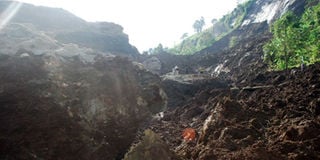Prime
Landslides bury five villages in Bududa

Survivors of yesterday's landslides stare at the collapsed Namirumba Parish, Bududa District. Photo by David Mafabi
What you need to know:
Thousands affected. Preliminary estimates showed some 3,000 people were displaced and in immediate need of assistance.
Bududa/Kampala.
Landslides yesterday afternoon covered up five villages in parts of Bushiyi Sub-county in the eastern Bududa District, but there was no immediate report of deaths.
The Sunday Monitor was told some 17 badly-injured survivors had been admitted to Bududa Hospital. One person was confirmed missing, the district chairman, Mr John Bosco Nambeshe, said.
A huge mass of soaked soil broke off from uphill, knocking down trees and toppling houses on its path in the third such blanket punishment by Mother Nature in the same district. In 2010, landslides flattened villages in Nametsi Parish, burying an estimated 350 residents. And where tragedy struck yesterday is close and adjacent to Nametsi.
Yesterday’s 3pm landslide which severely affected five villages in Namurumba, Bushiyi and Matuwa parishes, followed three days of heavy downpour and hailstorms that Uganda Red Cross Society secretary general, Mr Michael Wataka, said had earlier destroyed at least 10 homes and vast crop fields.
Preliminary estimates showed some 3,000 people were displaced and in immediate need of assistance, although up to 10, 000 of those living on the foot of Mt Elgon may eventually require relocation.
Many survivors were reported stranded on one of the high-risk villages cut-off by River Manafwa that burst its banks.
Government last evening said it was unable to evacuate the survivors using helicopters as requested by local leaders. Maj Gen Julius Oketta, the disaster and relief coordinator in the Office of the Prime Minister, advised them to move to safer areas uphill.
“I have told them [Bududa leaders] to tell survivors to move away from the river bank and relocate to higher areas that are safe,” the General said. “They should at this time forget about rescuing personal property in the house because they first need to keep alive.”
Survivors shift
Dozens of survivors were last evening spotted with mattresses and other salvaged household items on their heads, and trekking perilously to the safety of their relatives’ homes. Some hesitated, preferring they would rather die on their fertile ancestral land to which they profess a sturdy bond.
According to Wanjusi Kalisto, a local elder, it had been raining daily since Thursday but yesterday’s intensified downpour, which began falling around midday, combined with heavy hailstorm to wreak the nastiest havoc.
Vast gardens of coffee, banana and maize remained blanketed white with hailstones as dense cumulonimbus clouds drifted in the mountainous expanse, a warning sign of likely more rains and associated hazard. A recent hazard mapping by Uganda Red Cross Society, the National Environment Management Authority and Ministry of Disaster Preparedness, indicated a deepening uphill fissures running several kilometres across Mt Elgon ridges, potentially considered a trigger for landslides.
By press time, an emergency response team comprising police, UPDF soldiers and Uganda Red Cross volunteers led by Manafwa River Basin project manager Tumuwa Wanambwa was reported on ground to help in rescue efforts.
Officials said it was still too early to ascertain the extent of the damage, or how much resources would be required to restore normalcy.
The director general in the ministry of Health, Dr Ruth Aceng, last night dispatched a team of different health professionals to Bududa to do on-the-ground assessment and determine first-line of emergency response.
The Sunday Monitor understands both the government and other humanitarian agencies were considering supplying survivors with water purification tablets and household items as well as tarpaulins, as a temporary measure as discussions continue about their resettlement.
In 2010, the attempt to shift Mt Elgon area settlers to Kiryandongo District in Bunyoro suffered a setback after the survivors of the Nametsi landslide complained of improper shelter, lack of land as well as food and water in the new settlement, with hundreds returning to the landslide-prone homes voluntarily.
Yesterday’s disaster struck after the government announced it had released Shs8 billion for leaders in Bugisu sub-region to identify land for resettlement of the previous landslide victims after they preferred to relocate within the area so they can be able to cultivate their rich soils.



